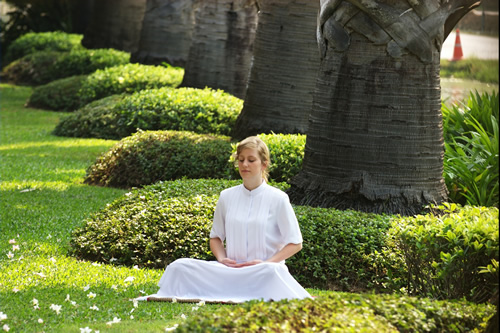|
Suan Mokkh International
Buddhist Meditation Retreat in Southern Thailand
By Rebecca Gados

|
|
A woman engaged in meditation in Thailand.
|
Suan Mokkh, a forest monastery in Southern Thailand, teaches that the end of suffering can be reached by attaching no value to the notions of "I" or "mine." Such a transformation in consciousness is practiced at Suan Mokkh through mindfulness of breathing, which means paying full attention to the breath without letting the mind wander to regrets about the past or anxieties about the future. If you are able to focus your full attention on the breath, you are there entirely in the moment, desiring nothing else. The practice promises to help you lead a happier and more peaceful life.
The monastery holds meditation retreats for foreigners in English once a month. There is no process to sign up in advance; you show up at the monastery on the first day of every month and prepare yourself for a deep silence that will last ten days. For these ten days, participants commit themselves to Buddhist monastic vows. The vows include abstaining from all sexual activity, beautifying oneself, sleeping on luxurious beds, and refraining from many other sensory pleasures. During the retreat, each participant is offered a private room with a mosquito net, a straw mat, and a "bed and pillow," consisting of a concrete slab and a smooth wooden block. Thai monks are not without humor, though. "It's a Buddha pillow," said a cheerful Thai monk to a group of about a hundred of us later on the first evening during our introductory talk. The monk then laughed in a good-natured manner. "And because you sleep on a concrete slab, you will be happy to get up at 4 a.m. to meditate!"
Daily Meditation Rituals at Suan Mokkh
Each day begins at 4 a.m. when a bell rings out in the still, damp darkness, and all the participants file out of their rooms into the meditation hall to listen to a reading. The reading is followed by yoga stretches to prepare the body for a day of sitting — the rest of the day alternates between walking and sitting meditation and dharma (Buddhist philosophy) talks. Two vegetarian meals are offered: one in the morning and one at midday. Hot chocolate is served in the evening instead of dinner, as it is one of the monastic vows not to eat after noon. Every day involves a work session where each participant signs up to clean a part of the monastery grounds. Meditators are encouraged to do this mindfully as part of the practice. Work meditation is one of the most important types of meditation to learn. You must pay attention to each stroke of the broom and be consciously aware of what you are cleaning. Such ritualized acts are aspects of learning to live fully in the moment. While on breaks from work, meditation participants can enter the natural hot springs — part of the monastery grounds. One hot spring is set aside for men and another for women. Appreciation of the silence and awareness of the moment is emphasized during this activity as well.
Participants are instructed throughout the course by the monks of Suan Mokkh, who teach basic meditation skills, tips for staying focused, Buddhist philosophy, and realizing higher stages of meditation. Meditation is an endless journey of self-discovery. The retreat is good for those new to meditation, but those who are experienced are also encouraged to attend. Due to the intensive nature of the retreat, only individuals in good mental and physical health should apply in person at Suan Mokkh.
The 10-day meditation retreat costs 2,000 baht (US$55 at the time of writing), which is enough to cover food expenses only. All else is covered through donations.
Visit the Suan Mokkh International Dharma Hermitage site for more information.
REBECCA GADOS grew up in Colorado Springs, CO. After teaching English in Japan for one year after graduating from Colorado College, she and her fiance, Jonathan Moore, traveled for 14 months by bicycle around Asia and Europe.
|
